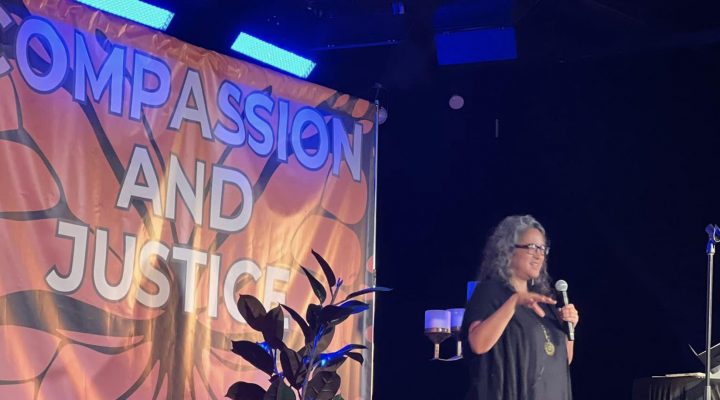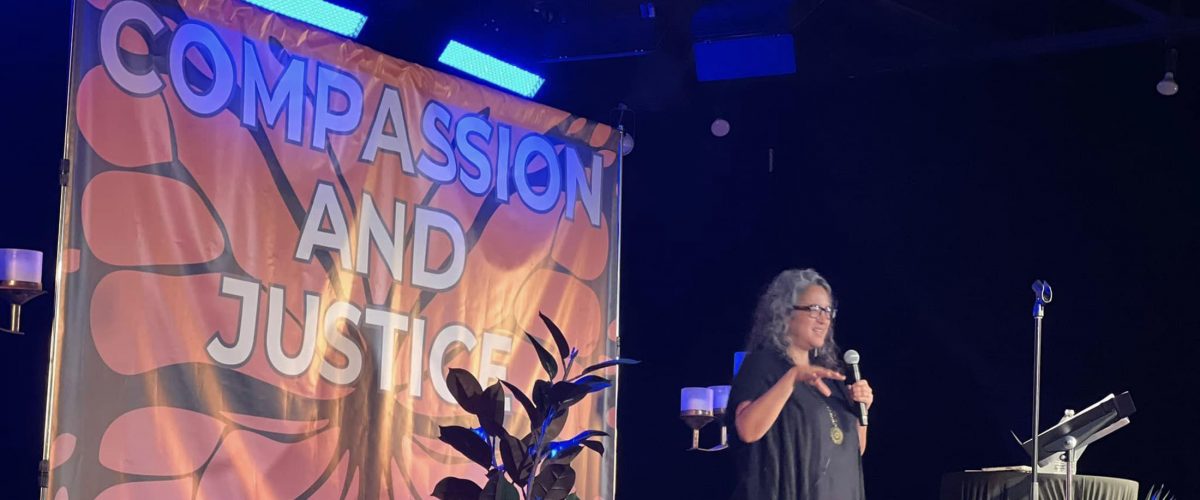Christianity for many Native Americans conjures memories of stolen land, oppressive boarding schools and the forced sterilization of women, Mariah Humphries said in the opening address at Fellowship Southwest’s Compassion and Justice Conference.
“This is what Christianity represents for Native Americans. All of this. When they think of Christianity, they think of this. When they think of Jesus, they think of this. They think of all of this and they don’t want any part of it,” said Humphries, a Native American Christian and executive director of The Center for Formation Justice and Peace.
“There are a lot of Christians in Native America, a lot of us. But we know the difference between American Christianity and Jesus,” she said. “And I think we need to get to the point where we are focusing more on Jesus and less on our American Christianity, especially when we’re talking about brown and Black bodies.”

Mariah Humphries
The conference at Life in Deep Ellum in Dallas brought together activists from across Fellowship Southwest’s nontraditional network of Christians who share a passion for serving vulnerable communities. This year’s theme focused on “connection,” in reference to the organization’s “Compassion, Justice, Connection” tagline.
Humphries urged Christians to become the example of Christ’s love and compassion that Native Americans have been denied for centuries: “We have failed as the people of faith, and I think we need to come together to be instruments of truth, justice, mercy, compassion and reconciliation grounded in charity. But we must be willing to listen and learn from the past as well as the present, because we’re created in the image of God.”
While securing the trust of Native American communities will be slow going, Christians can begin by making the effort to understand the importance of land and its stewardship to native people, she advised. “Tribal sovereignty is the most important thing for Native Americans. Just about everything that has to do with how we function as a people has to do with the sovereignty.”
But the federal government has an abysmal record when it comes to Native American sovereignty. In addition to campaigns of genocide waged against their communities, the nation has violated more than 500 treaties with hundreds of tribes in the U.S. and Alaska, Humphries said.
Tribal sovereignty over their own identity was attacked by the residential schools program run by government, churches and other private organizations from about the mid-19th to the mid-20th centuries. These programs forcibly removed Native American children from their homes and culture under the motto “Kill the Indian, save the man,” she said.
“These schools were government promoted and church controlled. The federal Indian boarding school system consisted of 417 institutions across 37 states or territories. These numbers do not include the 139 residential schools in Canada that targeted diverse nations.”
An 1866 report by the U.S. secretary of the interior appealed to churches and other religious institutions to support the program because they were uniquely qualified to address the “paganism” hindering Native Americans from fully assimilating to Eurocentric Christianity, Humphries said.
“Ruling against the Apache in this case is ruling against the spiritual lifeblood of my people.”
Separated from their own tribes and shipped to schools hundreds of miles from their homes, the youth were forced to adopt Western hair styles and clothing and to consume foods alien to their traditional diets. “Hundreds of children died and languages died as a result of English being the only language spoken, and when these children came back they didn’t speak their (mother) language so we’re having issues today with languages dying out.”
Pipeline and mining projects also have posed serious threats to tribal sovereignty, including the Oak Flat copper mine controversy involving mining on land sacred to the Apache and other nations who have appealed to the U.S. Supreme Court for relief.
“Sacred sites are where we connect with the Creator, our faith, our families and our land. Ruling against the Apache in this case is ruling against the spiritual lifeblood of my people,” Humphries said. “When there are sacred sites involved, like Oak Flat, whether they’re burial or ceremonial, all are sacred. It becomes a religious freedom issue. We should all be for religious freedom for everyone.”
The right to govern and protect their own bodies, especially those of women, is always jeopardized by the encampments of white male workers that accompany mining and pipeline operations on tribal lands, she explained. “More than 40% of Native American women experience sexual assault, and they are more than 2.5 times more likely to experience rape in their lifetimes. Murder is the third leading cause of death for indigenous women.”
Humphries said she was disturbed to learn that German dictator Adolf Hitler had praised the U.S. campaign of genocide and mass displacement of Native Americans before embarking on his own “final solution” against Jews and others the state deemed subhuman.
“When I think about the church being any part of the ideology and the atrocity of the Holocaust, that should make us really stop and think about what we’ve done historically and where we are going in the future and where we are right now.”
Related articles:
‘If we weren’t powerful, they wouldn’t try to stop us,” Justin Jones says
Look past fear and scarcity to embrace migrants, Carvalhaes urges


